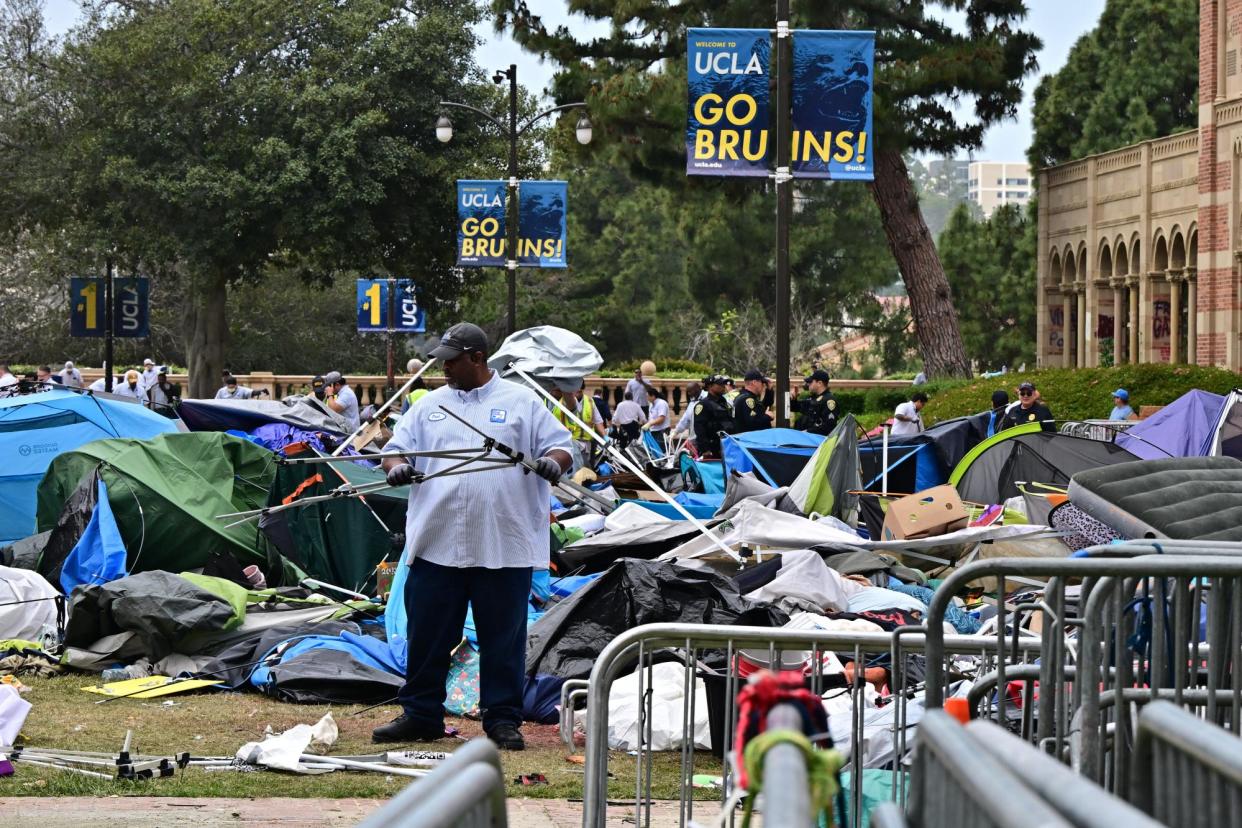The morning after police crackdown on a UCLA protest camp: ‘A lot of us are struggling’

At the University of California in Los Angeles on Thursday morning, staff were picking up the pieces after two nights of violence that shocked the urban campus.
A loader heaved the remnants of the Gaza protest encampment that law enforcement had forcefully cleared early in the morning, into a large grey dumpster. Pieces of plywood spray-painted with “We love you Gaza” and “ACAB” (“all cops are bastards”) still lay about.
Related: Police continue to arrest pro-Palestinian student protesters across the US
Students milled around. Some walked by the scene with their dogs, while others stood nearby taking photos in front of the slowly disappearing encampment. The sound of helicopters rang in the distance.
But the campus was quiet, at least compared with the earlier chaos, when police decked out in riot gear came into the encampment to shut it down.
Students and community members set up an encampment in support of Gaza at the urban LA campus on 25 April. Protesters demanded the University of California system divest from companies that invest in weapons manufacturing for the Israeli military, increase transparency about its assets, sever ties with Israeli universities, and call for an immediate and permanent ceasefire in Gaza. They also wanted UCLA to cut ties with the Los Angeles police department.
UCLA declared the encampment illegal on Wednesday evening, and law enforcement amassed near the campus. After an hours-long standoff, early on Thursday California highway patrol officers poured into the campus by the hundreds.
Officers wore face shields and protective vests, while demonstrators who wore helmets and gas masks chanted: “You want peace. We want justice.”
At least 132 people were arrested, Alejandro Rubio of the California highway patrol said on Thursday morning. UCLA police will determine what if any charges to seek, he added.
The clearance of the camp marked the second volatile night at UCLA. On Tuesday evening, a masked group attacked the encampment, tearing down part of the barricades protesters had set up. Hours of clashes between the group and the pro-Palestinian protesters camped out there ensued, with authorities slow to intervene and break up the groups.
Gene Block, UCLA’s chancellor, described the group that attacked the camp as “instigators”.
“However one feels about the encampment, this attack on our students, faculty and community members was utterly unacceptable,” he said.
Students described being attacked with projectiles, fireworks and chemical agents. A young woman in a hijab described being sprayed in the face with bear mace. Members of a student protest group told the Daily Bruin, a student newspaper, that “25 protesters within the pro-Palestine encampment were hospitalized overnight”. A University of California official estimated the number of injured as 15 people.
On Thursday morning, students were trying to make sense of the events that had shaken their campus in these last weeks of the semester.
Noah, a 24-year-old law student at UCLA who preferred to give only his first name, thought the violence of the past days could have been avoided had UCLA been better prepared to respond to the initial encampment.
“I’m not surprised,” he said of the creation of the encampment. “But I am shocked at UCLA for being completely unaware of what the situation was, and I’m shocked by the way the Los Angeles community has reacted.”
Final exams are coming up, Noah said. “A lot of us are really struggling to focus as we see these scenes of violence yards away from our law school campus,” he said. But since administrators have declared that final exams will proceed as scheduled, he’s left without a choice.
Related: Campus protests: UCLA students in standoff with police as demonstrations spread across US
Lauren Brown, another student, said she had spent last night elsewhere to escape the sound of helicopters directly over her dorm building.
She had been on campus the night before, and initially thought the firecrackers and yelling she heard from her dorm was coming from nearby frat houses.
Watching news coverage the next day was hard, she said.
“It was hard to watch. And I wondered where the police were,” Brown, a 19-year-old first-year student said. “I saw posts from people talking about them being teargassed and maced and campus security was just watching.”
Brown said she wasn’t sure whether she will return to her dorm room given the constant sound of helicopters. And while her parents are worried and want her to come home, she doesn’t feel unsafe or that her school year has been disrupted.
“I wouldn’t say [the protests] are an inconvenience, but it’s a big reality check that this is real stuff going on. I respect the protestors showing their freedom of speech because people in Gaza can’t do that because they’re being attacked.”

 Yahoo News
Yahoo News 
